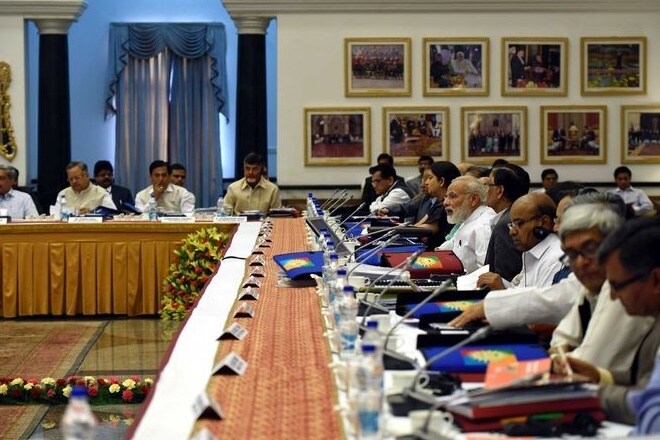After demonetisation and GST, Prime Minister Narendra Modi-led Union government is planning to pursue a number of reform measures, including some in the political space. While demonetisation, according to the government, helped in putting the country on the path of becoming a less cash economy, GST, which is guided by the idea of ‘one nation, one tax’, is expected to further boost the economy. The GST was recently passed by both houses of Parliament and it is likely to be rolled out on June 1. Modi government has several other ambitious reform measures on its agenda. PM Modi himself talked about a few of them while addressing the third meeting of the governing council of Niti Aayog on Sunday.
Here we take a look a five big reforms Modi government will push in the coming years:
1. Simultaneous Lok Sabha and State Assembly elections
On several occasions in the last one year, PM Modi has talked about the need to free the country of “cycle of elections.” He has appealed to opposition parties to debate and reach a consensus on holding simultaneous elections to the Lok Sabha and state assemblies of the country. On Sunday, the PM said that a “constructive discussion has begun on the subject of holding Union and State elections simultaneously.”
2. New January to December Financial Year
After advancing the presentation of Union budget by a month in February this year, PM Modi on Sunday talked about the idea of advancing the financial year from January to December. He said in a country where agricultural income is exceedingly important, budgets should be prepared immediately after the receipt of agricultural income for the year. The PM said there have been suggestions to have the financial year from January to December. He urged the states to take the initiative in this regard.
PM specially urged states to actively take part in ‘Ek Bharat Shreshtha Bharat.’ India’s unparalleled diversity is our pride. pic.twitter.com/MAQJFc3jZW
— PMO India (@PMOIndia) April 23, 2017
3. FDI reforms
Ever since coming to power in May 2014, Modi government has taken many FDI reform measures. It is now also mulling for a 100% FDI in single-brand retail through auto route. Last year in June, PM Modi had launched some sweeping reforms. “Govt radically liberalises FDI regime with the objective of providing the major impetus to employment & job creation,” Modi had said in a tweet. “Key reform decisions were taken at a high-level meeting chaired by the PM, which makes India the most open economy in the world for FDI,” he added.
In January this year, FE reported that the government was weighing in further easing FDI in single-brand retail to make it even easier for foreign companies to invest in India and cut delays in the flow of such investments, according to official sources.
4. Agriculture reforms, doubling farmers’ income
Apart from implementing decisions like crop insurance scheme and Neem-coating of Urea, Modi government is planning to introduce new measures to double farmers’ income in the next few years. For this, Niti Aayog is preparing new policies.
5. Evidence-based policy making
“The Niti Aayog is working on a platform for sharing best practices to strengthen the learning ecosystem. It has partnered with a large number of top-ranking Institutions for knowledge sharing and ideation, evidence-based policy making,” says a report by Niti Aayog.


